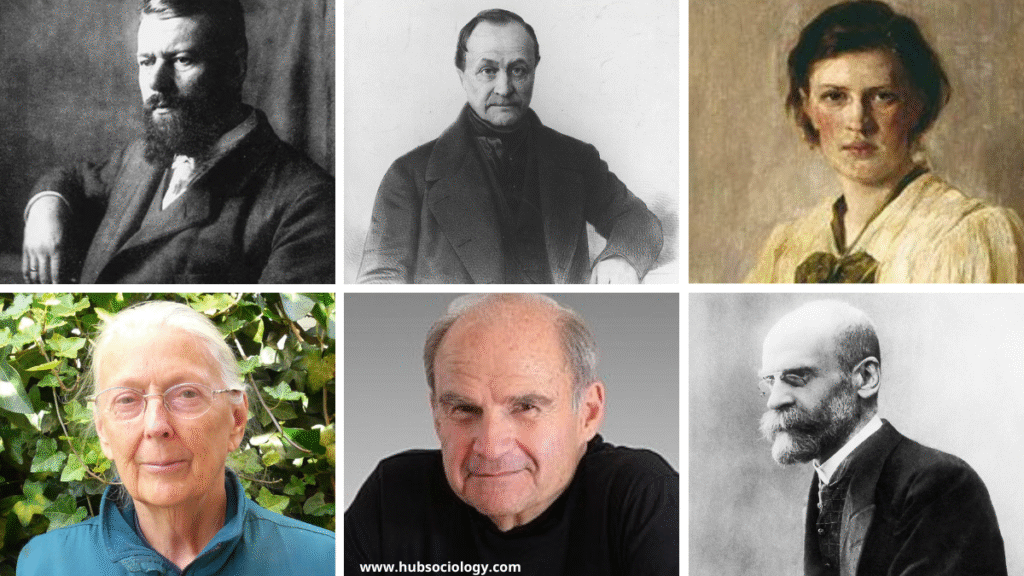Introduction on Functionalism in Sociology
Functionalism is one of the most influential theoretical perspectives in sociology, offering a framework for understanding how societies maintain stability and order. Rooted in the works of early sociologists such as Émile Durkheim, Herbert Spencer, and Talcott Parsons, functionalism examines social structures and institutions in terms of the functions they perform to sustain societal equilibrium.
This article explores the core concepts of Functionalism in Sociology, its key proponents, and real-world examples that illustrate its application in sociological analysis. Additionally, it discusses criticisms of functionalism and its relevance in contemporary sociology.
Core Concepts of Functionalism in Sociology
According to functionalism, society is a complex system whose components cooperate to foster stability and unity. It draws an analogy between society and a biological organism, where each institution (like family, education, or religion) serves a specific function to ensure the survival of the whole system.
1. Social Structure and Function
Functionalists argue that social structures—such as laws, norms, and institutions—exist because they fulfill essential societal needs. By upholding law and order, fostering interpersonal relationships, and controlling behavior, these institutions support society’s seamless operation.
2. Manifest and Latent Functions
Robert K. Merton expanded functionalist theory by distinguishing between:
- Manifest functions: The intended and obvious consequences of a social structure (e.g., schools educate students).
- Latent functions: The unintended and less obvious consequences (e.g., schools also serve as a platform for social networking).
3. Social Order and Stability
Functionalism places a strong emphasis on the role that norms and shared values play in preserving social cohesiveness. Institutions uphold these principles, guaranteeing that people live up to social norms.
4. Dysfunctions
While most social structures contribute positively to society, some may have negative consequences (dysfunctions). For example, crime disrupts social order but may also lead to societal improvements in law enforcement.
Key Proponents of Functionalism in Sociology

1. Émile Durkheim (1858–1917)
Durkheim, often regarded as the father of functionalism, argued that society is held together by social solidarity. In his study of suicide, he demonstrated how social forces (like integration and regulation) influence individual behavior.
2. Herbert Spencer (1820–1903)
Spencer introduced the idea of social Darwinism, comparing society to a living organism that evolves through differentiation and complexity. According to him, society evolve from simple to intricate structures.
3. Talcott Parsons (1902–1979)
Parsons developed the AGIL schema, which outlines four functional imperatives for societal survival:
- Adaptation (adjusting to the environment)
- Goal attainment (setting and achieving societal goals)
- Integration (coordinating social institutions)
- Latency (maintaining cultural patterns)
4. Robert K. Merton (1910–2003)
Merton refined functionalism by introducing middle-range theories, focusing on specific social phenomena rather than grand theories. His theories of dysfunctions and manifest/latent functions are still widely used.
Real-World Examples of Functionalism in Sociology
1. The Education System
- Manifest Function: Providing knowledge and skills for employment.
- Latent Function: Socializing children into cultural norms, fostering discipline, and creating social networks.
- Dysfunction: Reinforcing social inequalities through unequal access to quality education.

2. Religion
- Manifest Function: Offering moral principles and spiritual direction.
- Latent Function: Strengthening community bonds through shared rituals.
- Dysfunction: Sometimes leading to conflict between different religious groups.
3. The Family
- Manifest Function: Raising children and providing emotional support.
- Latent Function: Teaching gender roles and economic cooperation.
- Dysfunction: Dysfunctional families may contribute to social problems like domestic violence.
4. Government and Law
- Manifest Function: Maintaining order through laws and policies.
- Latent Function: Shaping national identity and patriotism.
- Dysfunction: Corruption and inefficiency can undermine trust in institutions.
5. Economy
- Manufacturing and delivering goods and services is the manifest function.
- Latent Function: Encouraging innovation and technological progress.
- Dysfunction: Economic inequality can lead to social unrest.
Criticisms of Functionalism in Sociology
Functionalism has been criticized for a number of reasons despite its contributions:
1. Overemphasis on Stability
Critics argue that functionalism ignores social conflict and change, presenting society as overly harmonious. Conflict theorists (like Marx) highlight power struggles and inequalities.
2. Conservative Bias
Functionalism tends to justify existing social structures, sometimes overlooking oppression and exploitation.
3. Neglect of Agency
It downplays individual agency, portraying people as passive conformists rather than active participants in shaping society.
4. Circular Reasoning
Some argue that functionalism explains institutions by their effects, leading to tautological reasoning (e.g., “Religion exists because it promotes social cohesion”).
Relevance of Functionalism Today
While newer theories (like conflict theory and symbolic interactionism) have gained prominence, functionalism remains useful for:
- Analyzing institutional roles in maintaining social order.
- Understanding large-scale societal stability.
- Examining unintended consequences of social policies.
Conclusion on Functionalism in Sociology
Functionalism provides a foundational lens for analyzing how social institutions contribute to societal stability. Sociologists can gain a deeper understanding of the intricate interactions between the structures that uphold social order by looking at both visible and hidden functions. However, its limitations—such as neglecting conflict and change—highlight the need for complementary perspectives in sociological analysis.

Despite criticisms, functionalism continues to offer valuable insights, particularly in studying education, religion, and government. As societies evolve, functionalist concepts adapt, ensuring their enduring relevance in sociology.
Do you like this this Article ? You Can follow as on :-
Facebook – https://www.facebook.com/hubsociology
Whatsapp Channel – https://whatsapp.com/channel/0029Vb6D8vGKWEKpJpu5QP0O
Gmail – hubsociology@gmail.com
Topic Related Questions on Functionalism in Sociology
5-Mark Questions on Functionalism in Sociology (Short Answer Type)
- Define functionalism in sociology.
- What is the difference between manifest and latent functions?
- Name two key sociologists associated with functionalism.
- Give an example of a latent function of education.
- What is meant by “social solidarity” in Durkheim’s functionalism?
- How does functionalism view society?
- What is a dysfunction in functionalist theory?
- How does religion contribute to social stability according to functionalism?
- What is Talcott Parsons’ AGIL schema?
- Why is functionalism sometimes criticized for being conservative?
10-Mark Questions on Functionalism in Sociology (Brief Essay Type)
- Explain the key concepts of functionalism with suitable examples.
- Discuss Durkheim’s contribution to functionalism in sociology.
- Compare and contrast manifest and latent functions with examples.
- How does functionalism explain the role of family in society?
- Critically evaluate the functionalist perspective on education.
- What are the strengths and weaknesses of functionalism?
- Explain Robert K. Merton’s critique of classical functionalism.
- How does functionalism analyze social institutions like religion and government?
- Why is functionalism compared to an organismic analogy?
- Discuss the relevance of functionalism in modern sociology.
15-Mark Questions on Functionalism in Sociology (Long Essay Type)
- Critically examine the functionalist perspective on social order and stability.
- Evaluate the contributions of Durkheim, Parsons, and Merton to functionalist theory.
- How does functionalism explain social institutions? Discuss with reference to education and economy.
- “Functionalism overemphasizes harmony and neglects conflict.” Discuss.
- Compare functionalism with conflict theory in analyzing society.
- Assess the usefulness of functionalism in understanding contemporary social issues.
- Discuss the impact of functionalism on sociological research methods.
- How does functionalism explain crime and deviance? Is this explanation convincing?
- Analyze the role of religion in maintaining social cohesion from a functionalist perspective.
- “Functionalism is outdated in today’s dynamic society.” Do you agree? Justify your answer.
Additional Discussion Questions
- How would a functionalist explain the rise of social media in modern society?
- Can functionalism adequately explain social change, or is it too static?
- How does functionalism differ from symbolic interactionism in analyzing social behavior?
